
The Walt Disney Co. effectively controlled the local government around the site of Walt Disney World in Orlando, Florida, for decades in what an extensive review by the state government calls “the most egregious exhibition of corporate cronyism in modern American history.”
After Disney bought the land that would become its massive amusement park and resort, it received permission from the Florida Legislature and governor in 1967 to create a local government, the Reedy Creek Improvement District.
From that time until Florida Gov. Ron DeSantis signed a bill Feb. 27 abolishing the Reedy Creek district, Disney heavily influenced the local government to its advantage, according to a new report Monday from the Central Florida Tourism Oversight District.
The legislation signed into law by DeSantis, a Republican, transformed the Reedy Creek district into the Central Florida Tourism Oversight District, which aims to root out what critics see as Disney’s corrupt hold over the local government.
In the report, a copy of which was provided early to The Daily Signal, the new Central Florida Tourism Oversight District claims that “Disney not just controlled the Reedy Creek Improvement District, but did so by effectively purchasing loyalty.”
Although the Reedy Creek district was a separate entity from the Walt Disney Co., the district treated its employees as if they were Disney employees, sometimes referred to as “cast members,” and awarded them lavish perks unavailable to the general public.
The new Florida government report used the expertise of George Mason University Professor Donald J. Kochan in governance; William Jennings at Delta Consulting Group in accounting; the consulting firm Kimley-Horn for engineering; and Public Resources Advisory Group Managing Director Wendell Gaertner for public finance.
The report notes: “Disney effectively bribed RCID employees (and retirees, members of the [RCID] Board of Supervisors, and vendor VIPs) by showering them with company benefits and perks: millions of dollars’ worth of annual passes to theme parks worldwide, 40% discounts on cruises, free transferable single-use tickets during the holiday season, steep discount on merchandise, marked discounts on food and beverage, and access to non-public shopping reserved for Disney cast members (where merchandise was greatly discounted and items were made available that were otherwise not available for public purchase).”
1. ‘Complimentary Tickets’
The Reedy Creek Improvement District provided employees, retirees, members of its Board of Supervisors, and certain VIPs with special-access tickets to Disney parks, which internal documents refer to as “complimentary tickets.”
RCID purchased these tickets from Disney, but rarely told employees that it paid the company for them.
Each employee of the district was offered a “complimentary ticket” which only he or she could use, and one complimentary ticket for his or her spouse, which only the spouse could use. Each employee also received at least three additional complimentary tickets, or the number of complimentary tickets equal to the number of dependents in the employee’s household if greater than three. Each additional ticket was not tied to a specific individual.
Employees of the Reedy Creek distrct and their guests could use these complimentary tickets to enter all Disney theme parks worldwide, with the sole exception of the Tokyo Disney parks. No such pass is available to members of the general public.
Employees generally understood that their passes were not available to the general public.
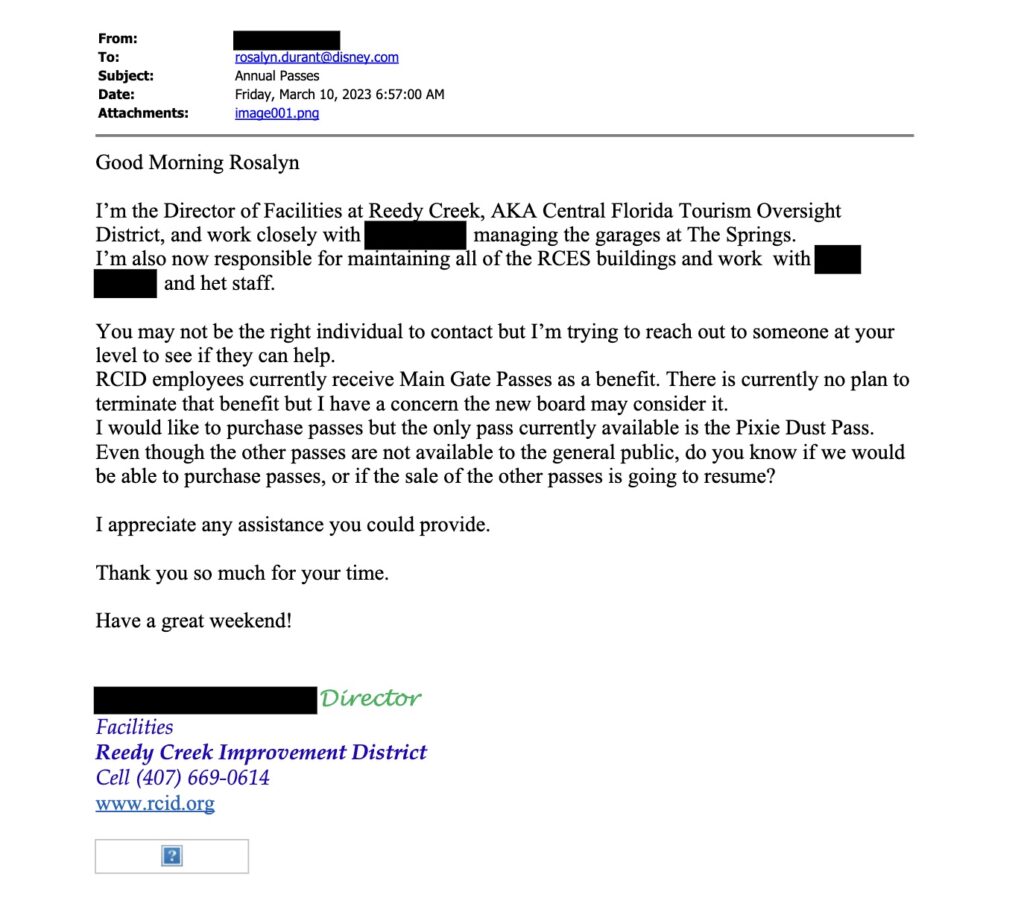
“It is reasonable to conclude that RCID employees considered themselves to have a special relationship (and special obligations) to Disney more akin to an employee/employer relationship than a government official/constituent relationship,” the report notes. “Employees who knew that the RCID paid for the complimentary tickets were still receiving a benefit not available to the general public, which is of significant ethical concern for government employees obligated to serve the public rather than a private corporation.”
The Reedy Creek district also used the complimentary tickets as an incentive to recruit employees. Even after RCID leadership decided to remove the mention of complimentary tickets from recruitment documents, these leaders still used the passes as an incentive.
RCID spent millions of taxpayer dollars on the passes, and still received steep discounts from Disney.
In 2019, RCID paid $725 for each complimentary ticket known as a Silver Pass. The highest-level Magic Key pass available to the general public at a cost of $1,399 gave the holder access to only two Disney parks (California’s Disneyland and California Adventure parks). The highest-level annual pass for the Disney World theme parks cost $1,219 and gave access only to the four Disney theme parks in Florida.
In 2021, the Reedy Creek district paid $1.5 million on complementary tickets reserved for its employees.
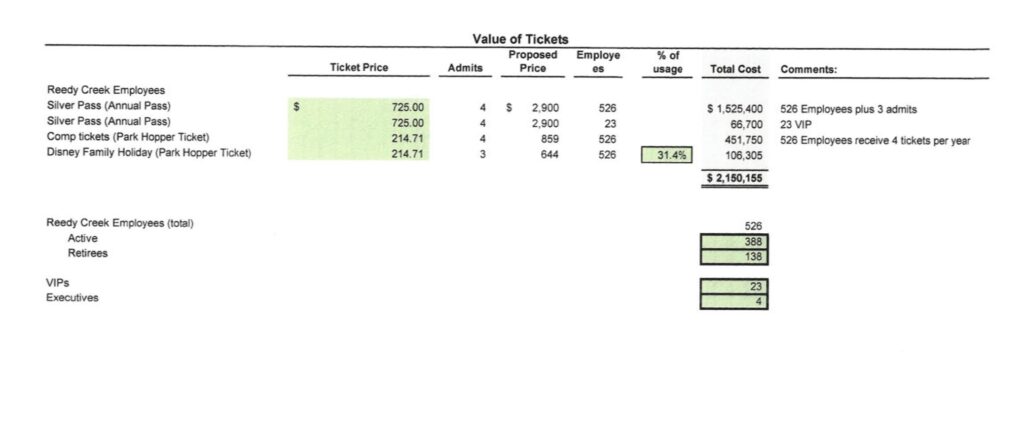
2. Other Tickets, Passes
Each active and retired employee of the Reedy Creek district could receive four additional passes, each admitting one individual to a U.S.-based Disney theme park for one visit, including the ability to “hop” to other theme parks on the same day.
RCID employees could give these tickets as gifts or give them to charitable organizations to raffle off as prizes. The general public cannot purchase fully transferrable, single-use tickets such as this.
The district’s employees also claimed additional transferrable park-hopper tickets during the Christmas holiday season. Employees could claim up to three such tickets; the 31 employees who claimed these tickets in 2021 cost the district $106,305.
The complementary tickets and transferrable tickets cost taxpayers dearly. In 2019, for example, RCID spent $1.8 million on these tickets. This paid for tickets for 382 active district employees, 125 of its retirees, four executives, and 19 “VIPs,” a group that included members of the RCID Board of Supervisors and some outside vendors, including lawyers.
The Reedy Creek district paid $713,603 on these tickets in 2013; by 2021, that amount had nearly tripled to $2.15 million.
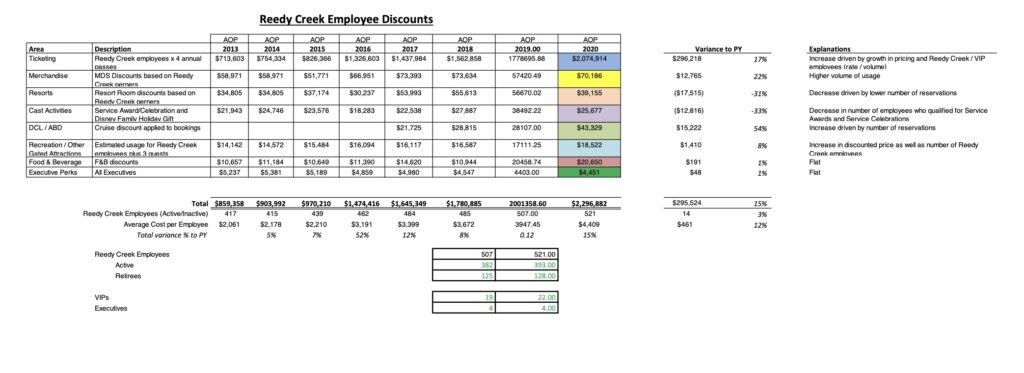
The Reedy Creek Improvement District apparently concealed these payments in annual financial reports. The district included these costs in a section titled “Transactions with Principal Landowners” and characterized the payments as “financial and other administrative services.”
“The RCID’s annual financial reports misleadingly concealed the purpose of these multimillion [-dollar] annual payments,” the Florida government report states.
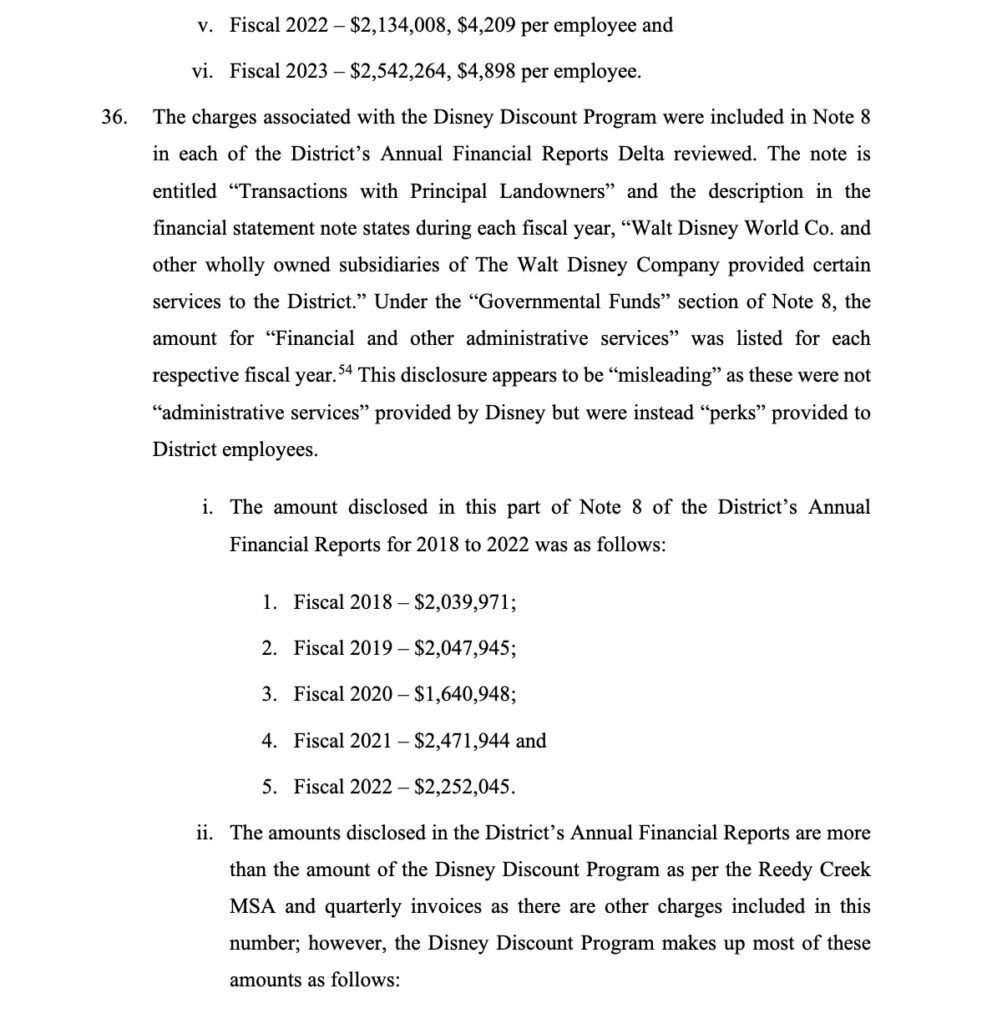
3. More Benefits
Disney managed the complimentary tickets and other benefits for employees of the Reedy Creek Improvement District by issuing RCID employees a personnel number known as a “perner, using the exact same system for Disney “cast members.” Disney used these perners to track RCID employees’ park attendance, spending, and other uses of the Disney benefits.
The Reedy Creek district provided employees with a 50% discount on Disney cruises for booking up to three rooms—the same discount available to Disney employees. District employees needed to inquire about the discount, however, because the RCID did not appear on the cruise line’s list of Disney employees.
A cruise director told one employee of the district that RCID didn’t appear on the list “due to the sunshine state laws” of Florida.
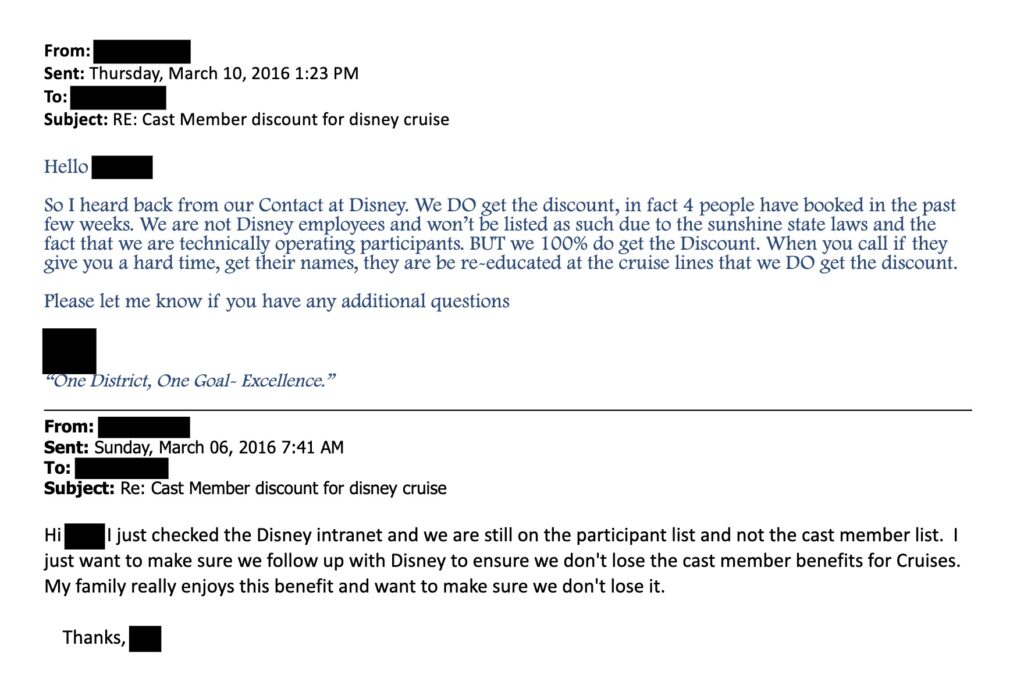
“This statement suggests that at least some people at Disney may have understood that it was likely improper for RCID employees to receive these benefits and therefore made an effort to evade public scrutiny,” the Florida government’s report notes.
Although RCID paid Disney the cost of these cruise discounts at the end of the year, most employees of the district who used the benefit didn’t know this. At least one employee who used the discount asked someone to “please extend by appreciation to the [Disney] World Corporation for this benefit.”
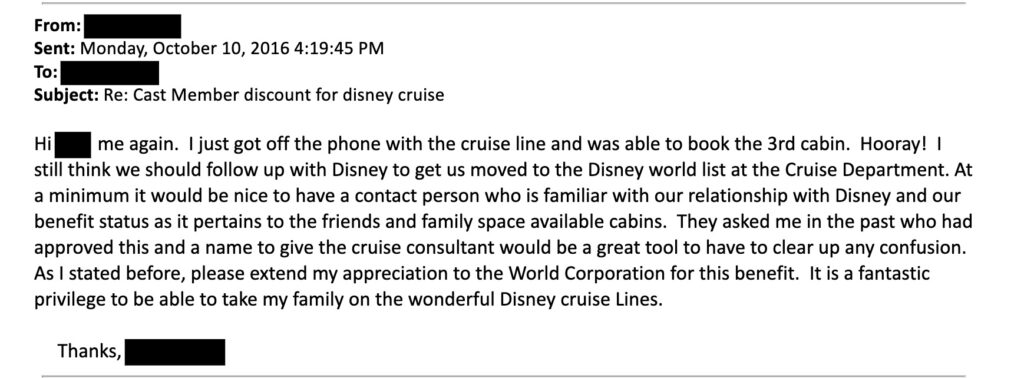
Employees of the Reedy Creek Improvement District received a discount on Disney theme park merchandise and could shop at stores exclusively reserved for Disney employees. These locations offer discounted Disney merchandise and Disney items not made available to the general public, such as old decorations from Disney resorts and hotels.
“The net result of this arrangement is that Disney received full sticker price payment for merchandise purchased using RCID employees’ discounts, while many—and more likely, most—employees believed the discounts were provided as a complimentary benefit from Disney,” the state’s report explains.
RCID paid between $51,700 (in 2015) and $73,600 (in 2018) for the merchandise discounts.
The Reedy Creek district also offered employees discounts on food and beverages at Disney restaurants. The district reimbursed Disney $20,459 in 2019, $20,650 in 2020, and $24,482 in 2021 for employee food and beverage discounts.
4. Disney Events
Employees of the Reedy Creek Improvement District also attended many events at Disney, and RCID hosted many parties at Disney locations to celebrate employee milestones.
RCID employees could purchase discounted tickets for Disney holiday events, and the district paid Disney for these discounts.
Disney hosts an annual celebration for its “cast members” who have reached years-of-service milestones, such as 10, 15, or 20 years with the company. Disney invited RCID employees to join these celebrations on the same terms as Disney “cast members,” and the district reimbursed Disney for its employees’ costs at these events.
RCID also held lavish parties at Disney locations for the district’s own employees, and gave some employees lavish gifts to celebrate milestones.
The Reedy Creek Improvement District hosted a holiday party for its executives and members of its Board of Supervisors. In 2022, the party—held at the Walt Disney World Swan & Dolphin Reserve hotel—cost more than $27,000. Sixty people attended the party, which featured a “plated dinner” of “filet and shrimp” at a cost of $220 per guest.
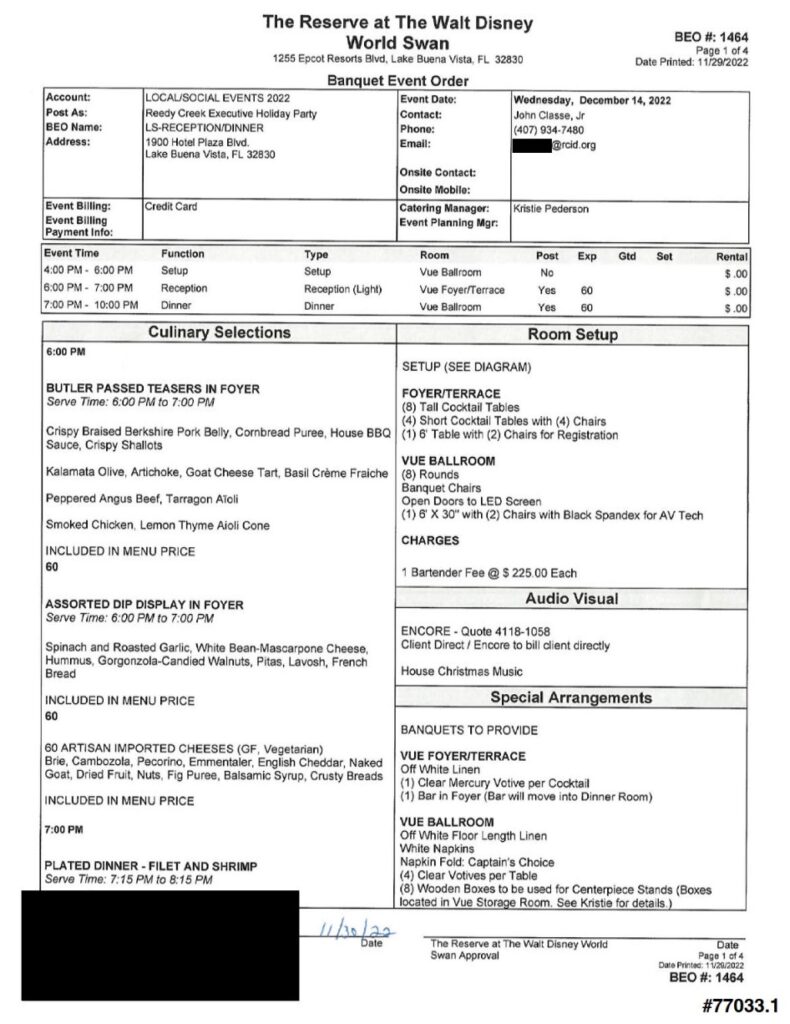
RCID also paid $14,842 for a retirement party at Disney’s Yacht Club Resort. The event featured a dessert bar and a premium beer and wine package.
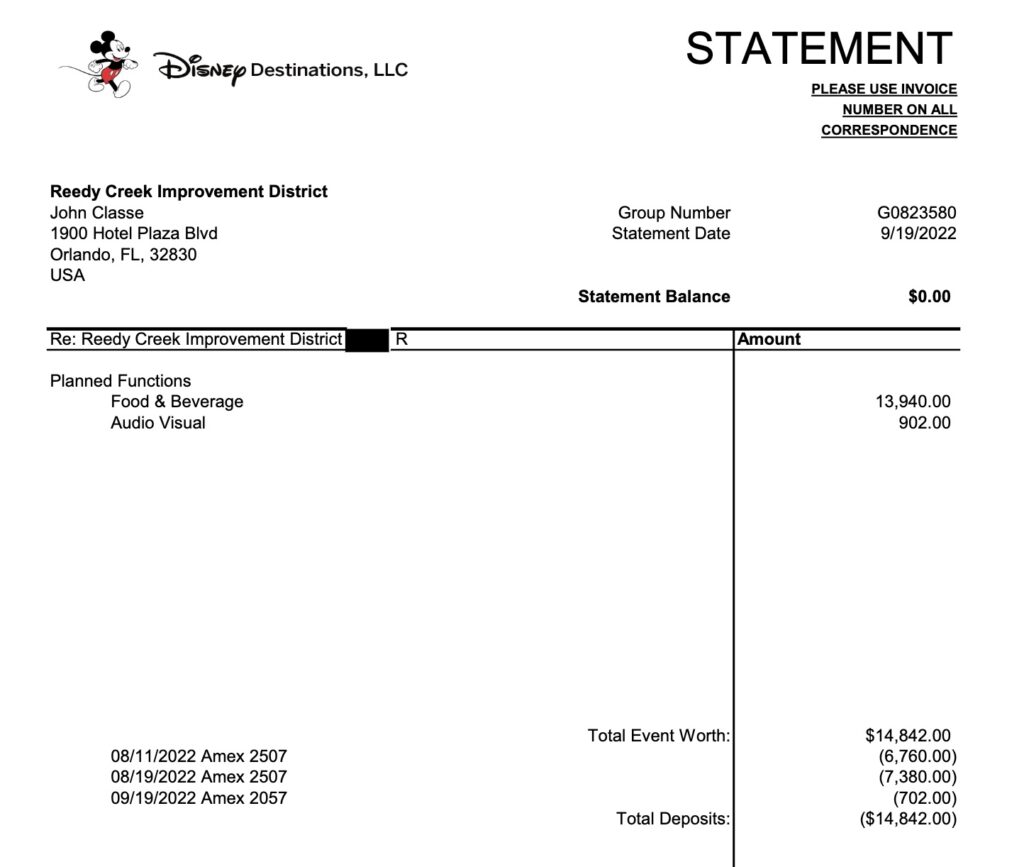
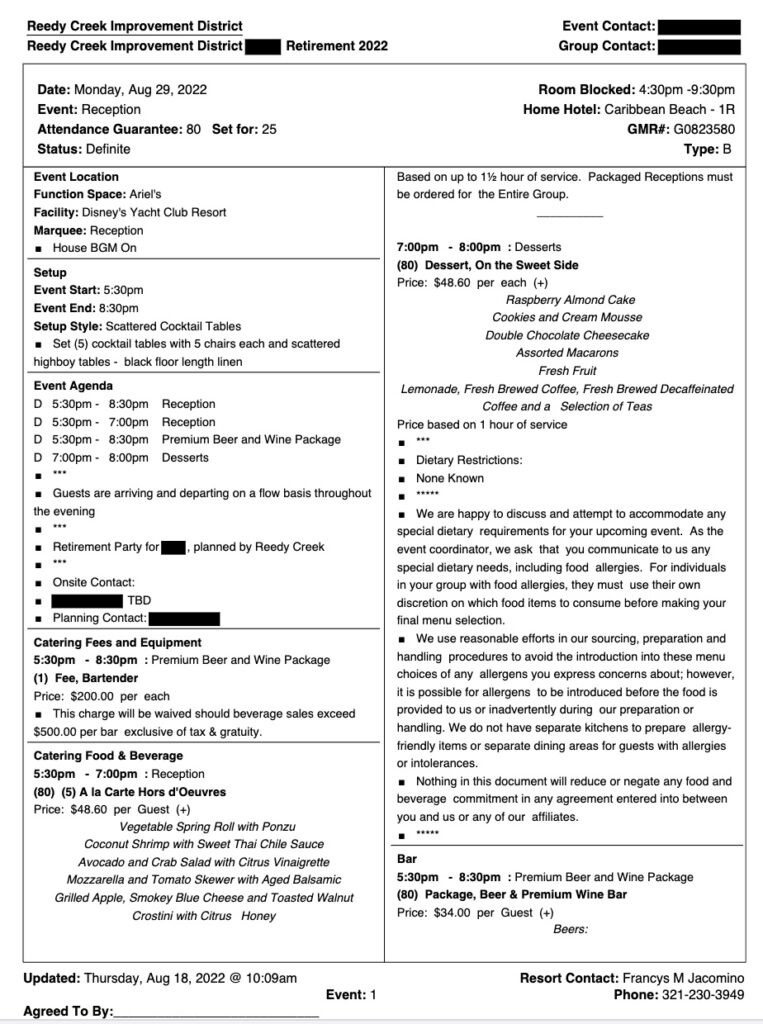
When a longtime RCID employee died in 2022, the district paid more than $33,600 for a “Celebration of Life” event at the Disney Coronado Springs resort.
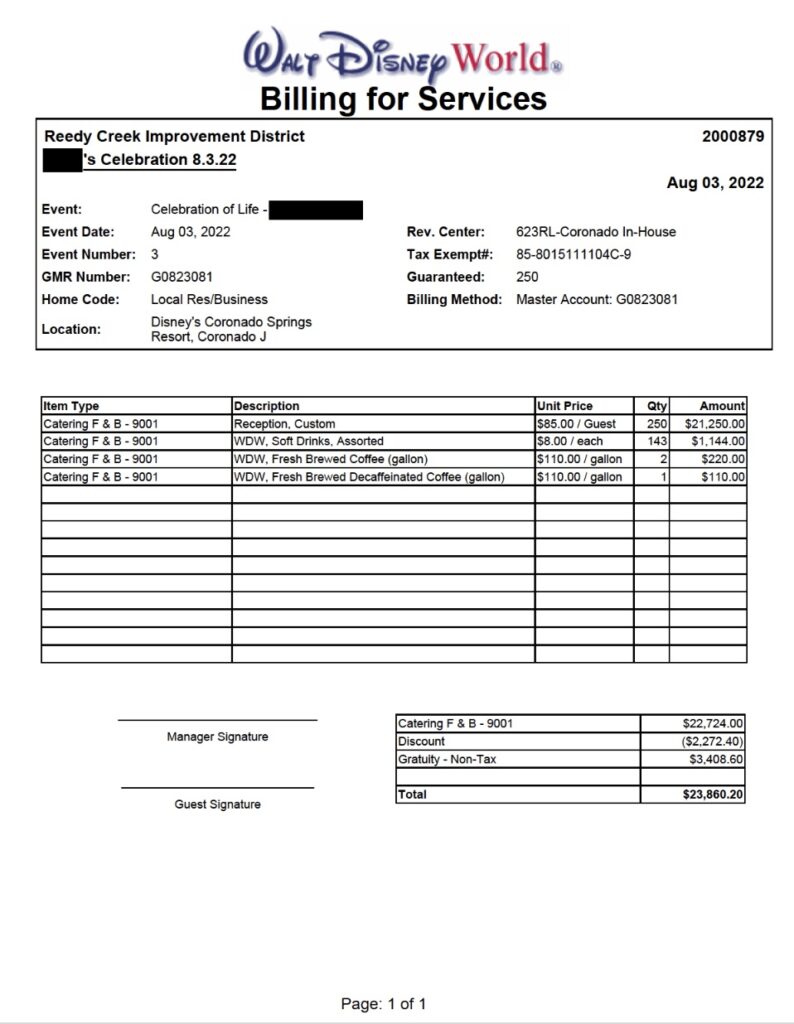
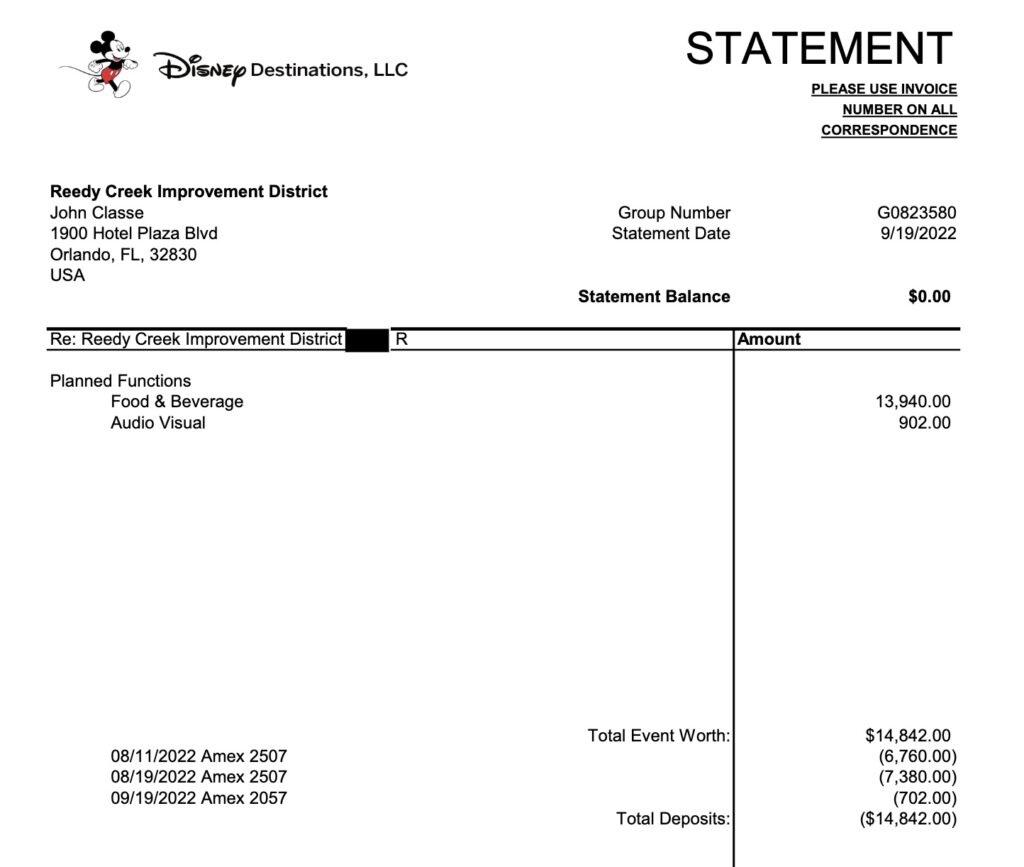
5. ‘Magic Behind the Magic’
“The foregoing benefits cultivated the view among RCID employees that they were a valued
part of the Disney corporation—indeed, that they were the ‘Magic Behind the Magic,’ a popular
RCID catchphrase,” the Florida government report notes.
The existence of these benefits demonstrates that the district “was ‘captured’ by Disney, even though it was simultaneously charged with regulating Disney,” the report says.
The report says that this “captured” relationship “creates a perception that the RCID was not neutral when Disney’s interests happened to conflict with the interests of other RCID residents, taxpayers, non-Disney guests, surrounding municipalities, the state of Florida, or members of the public generally.”
The Reedy Creek Improvement District seems to have followed Disney’s beck and call.
The state’s report says that when RCID worked on a road project that would affect Disney and the nearby Defense Department-owned Shades of Green resort for military veterans, district employees weighed in. In internal documents, District employees noted of various proposals: “Disney doesn’t want,” “Disney really doesn’t want,” and “Disney likes but I have been told Shades does not want.”
RCID ultimately followed Disney’s preference, cutting off pedestrian access from the military veterans’ resort to a Disney resort.
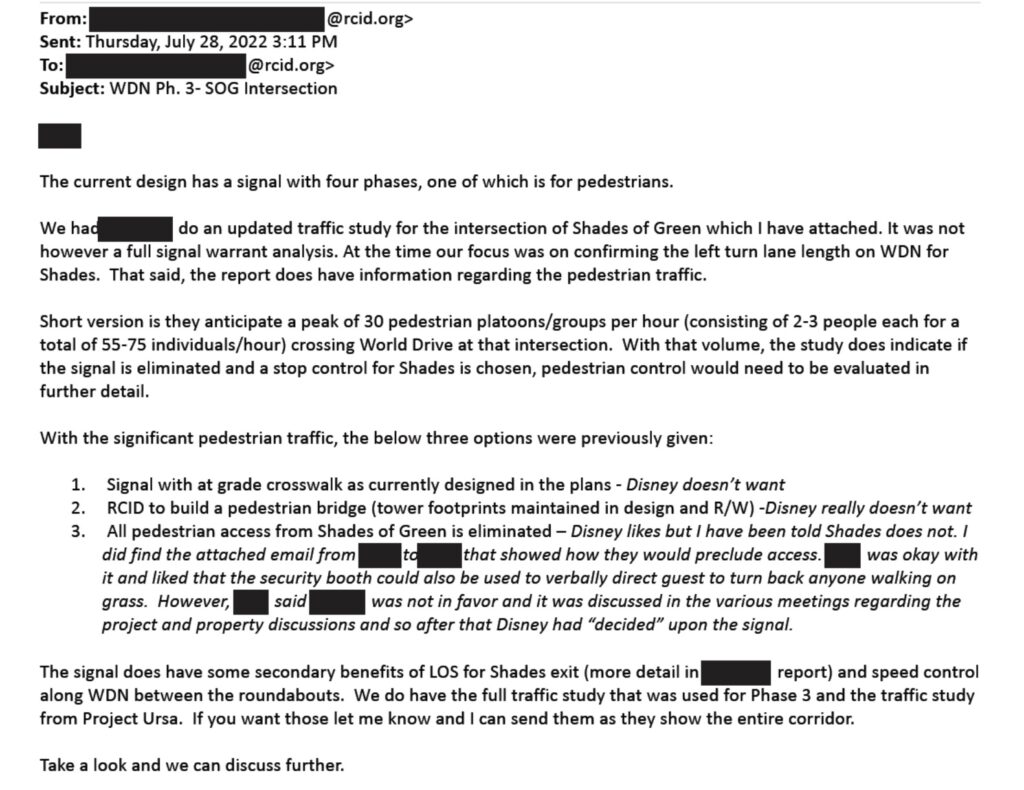
In July 2022, one RICD employee said of a colleague: “He is very worried about being subject to the whims of Disney. I replied, ‘What else is new?’”
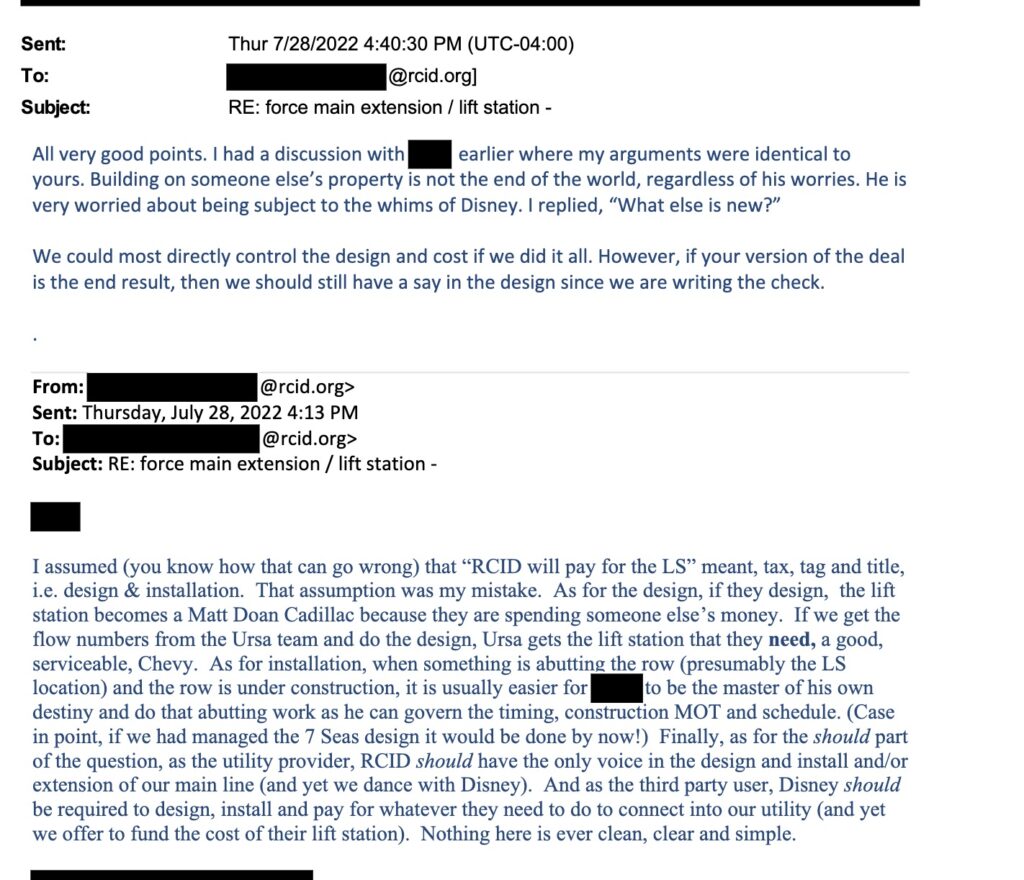
When DeSantis suggested that, as governor, he would propose significant changes to the Reedy Creek Improvement District, the district reached out to Disney to collaborate on an incentive program to keep RCID employees from jumping ship.
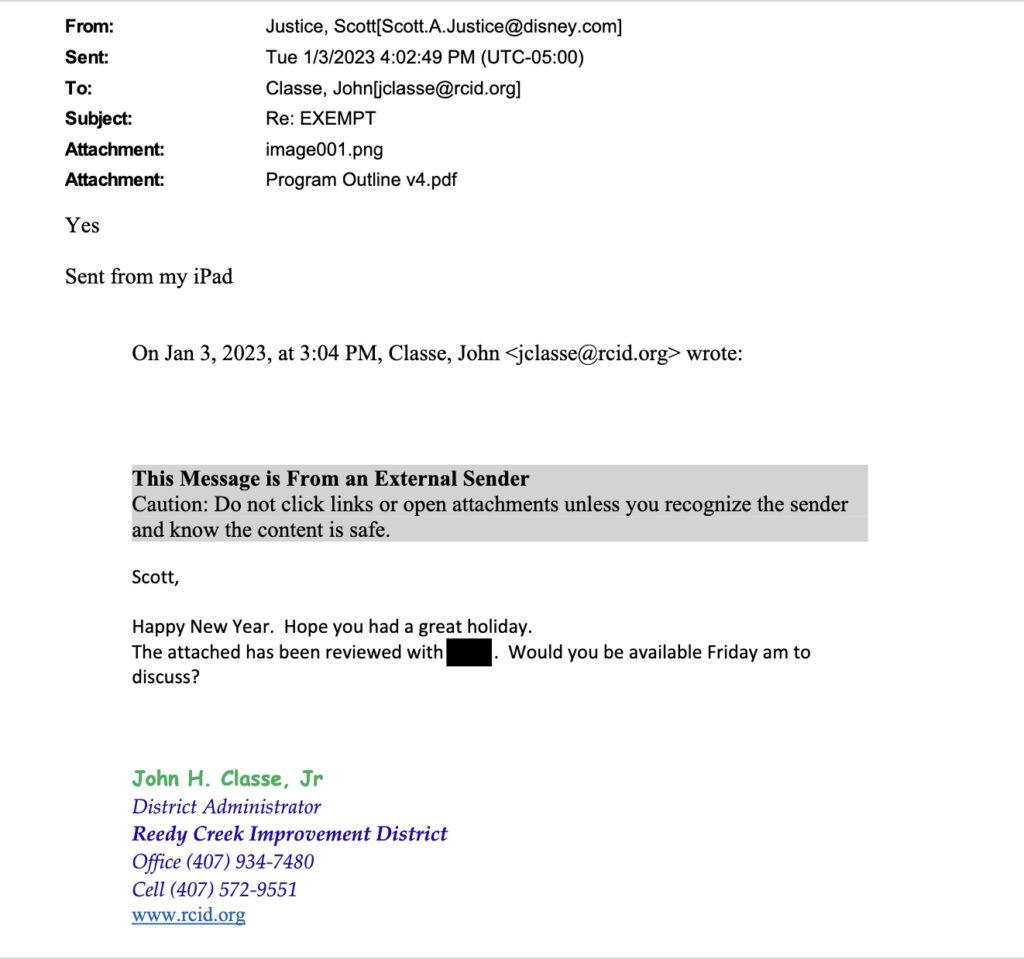
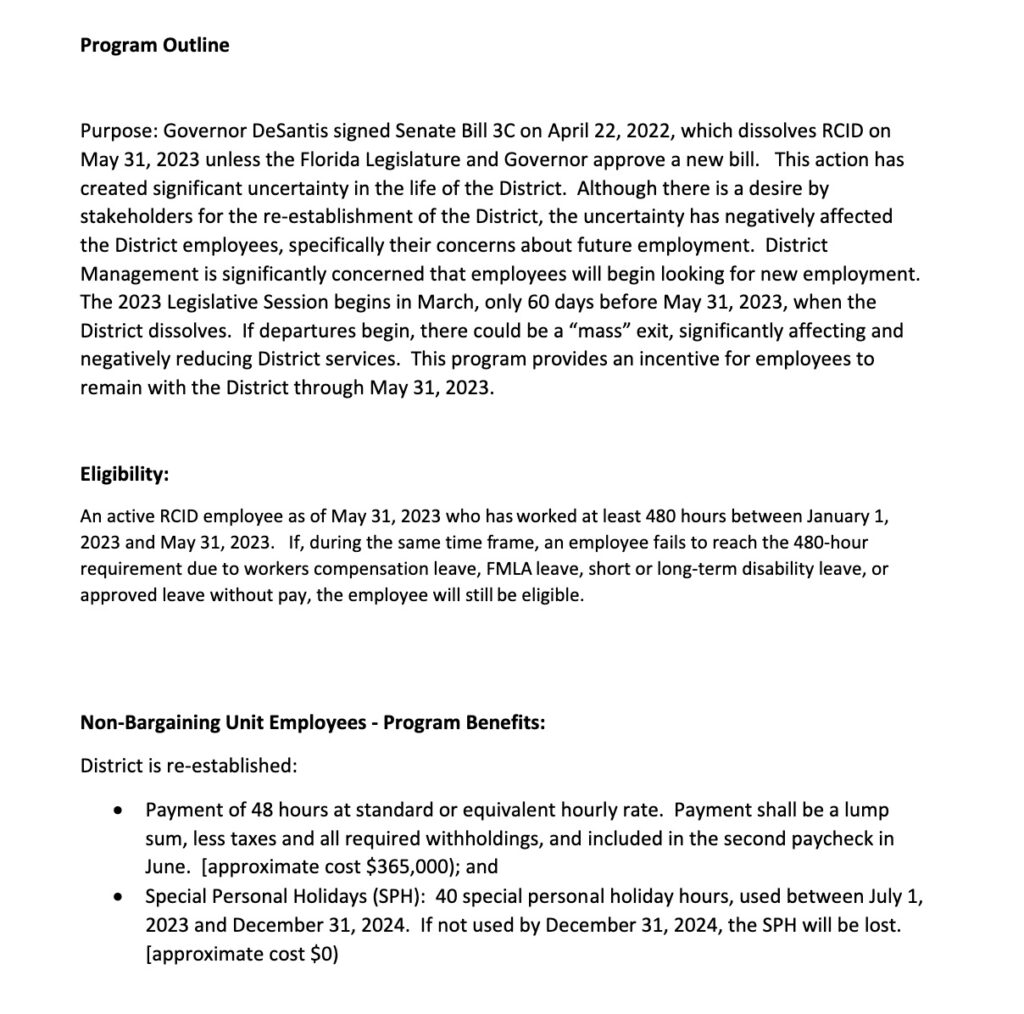
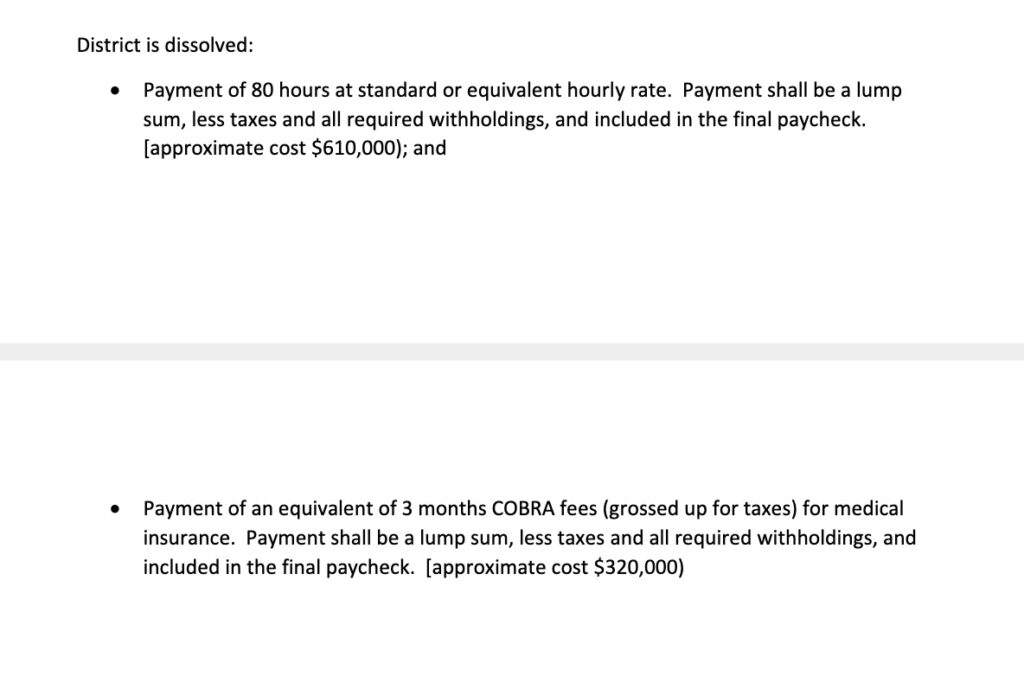
“RCID’s entanglement with Disney made it difficult for RCID employees to know where RCID responsibilities ended and Disney responsibilities began,” Florida’s report concludes.
The Daily Signal has sought comment from The Walt Disney Co. and will update this story if Disney responds.
Have an opinion about this article? To sound off, please email letters@DailySignal.com, and we’ll consider publishing your edited remarks in our regular “We Hear You” feature. Remember to include the URL or headline of the article plus your name and town and/or state.

